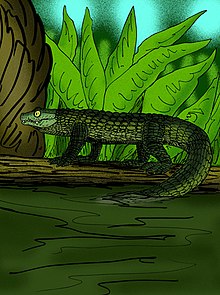Mekosuchine
| Mekosuchinae Temporal range: Eocene - Holocene, 56–0.003 Ma |
|
|---|---|
 |
|
| Life restoration of Mekosuchus inexpectatus | |
| Scientific classification | |
| Kingdom: | Animalia |
| Phylum: | Chordata |
| Class: | Reptilia |
| Order: | Crocodilia |
| Family: | Crocodylidae |
| Subfamily: |
†Mekosuchinae Willis, Molnar & Scanlon, 1993 |
| Type species | |
|
†Mekosuchus inexpectatus Balouet & Buffetaut, 1987 |
|
| Genera | |
Mekosuchinae is an extinct subfamily of crocodiles from Australia and the South Pacific. They first appear in the fossil record in the Eocene in Australia, and survived until the arrival of humans-in the in Australia and within the Holocene in the Pacific islands of Fiji, New Caledonia and Vanuatu. There is however disagreement on whether or not Mekosuchinae is a subfamily within Crocodylidae, or a distinct family, Mekosuchidae, on its own within the superfamily Crocodyloidea.
Mekosuchine crocodiles were a diverse group. One of the last species, from Holocene New Caledonia, called Mekosuchus inexpectatus may have been arboreal. The early Miocene species, Harpacochampsa camfieldensis, may have resembled a false gharial. Another mekosuchine fossil, currently undescribed, has been found in Miocene deposits from New Zealand. One genus, Mekosuchus, managed to spread to the islands of the Pacific; it is believed to have island-hopped across the Coral Sea, moving first to a now submerged island known as Greater Chesterfield Island, then New Caledonia and onwards.
In the , Quinkana was one of the top terrestrial predators of the Australian continent.
Mekosuchines, with the exception of Quinkana (which was wiped out during the Quaternary extinction event) became extinct in Australia after the Pliocene. The group survived on Vanuatu and New Caledonia until the arrival of people, who are presumed to have driven them to extinction.
...
Wikipedia
